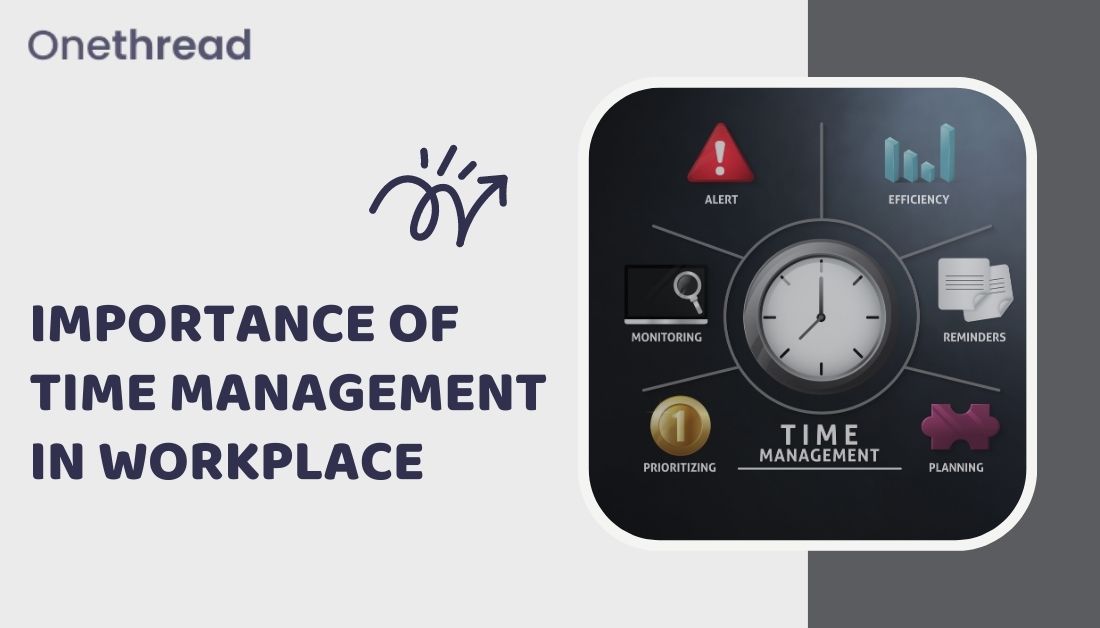“Time isn’t the main thing. It’s the only thing.” – Miles Davis
Unlocking the secret to peak performance in the workplace is a quest pursued by many professionals. Amidst the fast-paced nature of modern work environments, one crucial element stands out as a game-changer: time management.
The ability to effectively manage time is not just a valuable skill; it’s a superpower that empowers individuals to achieve more, reduce stress, and excel in their careers.
In this article, we delve into the significance of time management in the workplace and explore how it can transform your professional life.
Whether you’re a seasoned professional or just starting your career, the principles and insights shared here will provide the tools to optimize your productivity, improve your work-life balance, and excel in your chosen field.
What is time management in the workplace?

Time management in the workplace refers to the ability to effectively allocate and utilize time to complete tasks, meet deadlines, and achieve goals within a professional setting. It involves planning, organizing, and prioritizing activities to maximize productivity, minimize wasted time, and ensure optimal use of resources.
To better understand time management in the workplace, let’s consider a real-life example:
Imagine a marketing manager overseeing multiple campaigns, coordinating with team members, and meeting tight project deadlines. Without proper time management, the manager might constantly rush to complete tasks at the last minute, leading to stress, errors, and missed opportunities.
However, with effective time management practices, the marketing manager can create a structured approach to their work. They might start by assessing the importance and urgency of each task, categorizing them accordingly. They then allocate specific time slots for high-priority tasks, ensuring they receive the necessary attention and are completed on time.
How does poor time management affect your career?

Poor time management can have significant negative impacts on your career. Let’s see how.
Missed Deadlines and Poor Quality Work
When time management is lacking, meeting deadlines becomes challenging. Tasks pile up, and the pressure to complete them within limited time increases. This can lead to missed deadlines or rushed work that lacks quality. For example, software developers who consistently fail to manage their time effectively might deliver buggy code or incomplete features, damaging their reputation and hindering career growth.
Increased Stress and Burnout
Poor time management often results in increased stress levels and burnout. When time is not managed well, workloads become overwhelming, and individuals constantly play catch-up. This can lead to high levels of stress, decreased job satisfaction, and ultimately burnout.
An example is a project manager who constantly works late hours, neglecting personal well-being and experiencing burnout, negatively impacting their ability to lead and deliver successful projects.
Missed Opportunities for Growth and Development
Ineffective time management can prevent individuals from taking advantage of opportunities for growth and development. When time is not properly allocated, there is little room for learning new skills, attending training sessions, or networking with industry professionals.
For instance, a marketing professional who fails to manage their time might miss out on attending conferences or workshops that could have expanded their knowledge and opened doors to career advancement.
Strained Professional Relationships
Bad time management can strain professional relationships, especially when it affects teamwork and collaboration. Constantly missing deadlines or being disorganized can frustrate colleagues who depend on your input.
This can create a negative perception of your reliability and competence, damaging relationships and potentially impacting future collaboration opportunities. An example is a sales representative who consistently fails to manage their time effectively, causing delays in providing necessary information to the marketing team, resulting in strained relationships and decreased synergy.
Limited Career Advancement
Effective time management is often a key factor in career advancement. When time is not managed well, taking on additional responsibilities or pursuing higher-level roles becomes difficult. Employers value individuals who can demonstrate the ability to meet deadlines, handle multiple tasks, and make efficient use of time and resources. A professional struggling with time management may be overlooked for promotions or career growth opportunities.
Benefits of time management in the Workplace

According to research by Developed Academy, 82% of people do not use any time management method in the workplace. Hundreds of benefits are there for effective time management in the workplace. Let’s see a few.
Enhanced Productivity and Efficiency
“Time is really the only capital that any human being has, and the only thing he can’t afford to lose.” – Thomas Edison.
Effective time management allows individuals to maximize their productivity and efficiency. Professionals can accomplish more in less time by prioritizing tasks, eliminating distractions, and focusing on key objectives. This leads to increased output and higher-quality work.
Improved Work-Life Balance
Time management enables individuals to find a balance between work and personal life. By allocating time for both professional responsibilities and personal activities, individuals can reduce stress, prevent burnout, and enjoy a fulfilling personal life alongside their careers.
For example, someone who manages their time effectively may have designated periods for family, hobbies, and self-care, ensuring a well-rounded and satisfying lifestyle.
Reduced Stress and Improved Well-being
Effective time management helps reduce stress and improve overall well-being. When individuals have control over their schedules and complete tasks promptly, they experience less pressure and anxiety.
This allows for better focus, creativity, and a sense of accomplishment. For instance, someone who organizes tasks and sets realistic deadlines can approach their work more calmly and confidently, leading to a more positive work environment.
Delivering on Time
Effective time management enables individuals to deliver work on time consistently. Professionals can ensure that projects and assignments are completed within the allocated time frame by setting realistic deadlines, planning tasks, and adhering to schedules. This reliability in meeting deadlines enhances their professional reputation and builds trust with colleagues, clients, and stakeholders.
Better Leisure and Family Time
“Success is not just about making money. It’s about making a difference, having a balanced lifestyle, and spending time with your family.” – Unknown
Proper time management allows individuals to create a healthier balance between work and personal life. By efficiently managing their time during work hours, individuals can avoid excessive overtime and have more quality leisure and family time. This balance is essential for personal well-being, maintaining relationships, pursuing hobbies, and enjoying a fulfilling life outside of work.
Improved Quality of Work
Effective time management allows individuals to allocate sufficient time and attention to each task, resulting in higher-quality work. When individuals can focus on their tasks without rushing or feeling overwhelmed, they can pay attention to detail, conduct thorough research, and ensure accuracy. This leads to superior outcomes, client satisfaction, and professional growth.
Reduced Procrastination
“Procrastination is the thief of time.” – Edward Young
Time management techniques help individuals combat procrastination. By breaking down tasks into manageable steps, setting deadlines for each stage, and prioritizing accordingly, individuals can overcome the tendency to delay or avoid important work. This proactive approach keeps projects on track, minimizes stress, and enhances productivity.
Increased Opportunities for Growth and Learning
By managing time effectively, individuals create opportunities for personal and professional growth. They can allocate time for skill development, continuous learning, and networking with well-organized schedules.
This enables them to stay updated with industry trends, enhance their expertise, and pursue new career opportunities. For example, someone who dedicates regular time to attending workshops, online courses, or industry events can expand their knowledge and stay ahead in their field.
Improved Decision Making and Planning
Effective time management facilitates better decision-making and strategic planning. Individuals with a clear overview of their tasks, deadlines, and priorities can make informed decisions about resource allocation, project timelines, and goal setting.
This ensures that efforts are focused on the most crucial aspects of work. For instance, a manager who effectively manages their time can allocate resources, delegate tasks, and plan project milestones precisely, resulting in smoother operations and successful outcomes.
Improved Focus and Concentration
Effective time management helps individuals maintain focus and concentration on their tasks. By allocating dedicated time blocks for specific activities and minimizing distractions, such as excessive emails or social media usage, individuals can immerse themselves in their work, increasing productivity and higher-quality output.
Enhanced Professional Reputation
Effective time management contributes to a positive professional reputation. When individuals consistently meet deadlines, deliver high-quality work, and are reliable in their commitments, they earn the trust and respect of their colleagues, superiors, and clients. This reputation can increase opportunities, career advancement, and a strong professional network.
Increased Job Satisfaction
When individuals effectively manage their time, they experience a greater sense of control and accomplishment. They can prioritize tasks aligned with their goals and values, resulting in a more satisfying work experience.
By reducing time wasted on unproductive activities and focusing on meaningful work, individuals can derive greater satisfaction from their contributions and feel more fulfilled.
How to manage time effectively in the workplace for better success

Give me six hours to chop down a tree and I will spend the first four sharpening the axe. -Abraham Lincoln
Knowing how to prepare yourself for effective time management is important. Let’s show you how to manage time effectively in the workplace for a better career.
Use Time Tracking Software
Time-tracking software is a valuable tool for managing time effectively in the workplace. It offers several benefits that can greatly improve productivity and help individuals and businesses better understand how time is utilized. Here are some reasons why using time-tracking software is beneficial:
- Accurate Time Measurement:
- Increased Productivity
- Project Monitoring and Accountability
- Data-driven Decision Making.
But where can you find good time management software to help you achieve all those benefits? Well, we have a great suggestion for you. Our Onethread software can help you.
Let’s discuss some key features of our time-tracking software and how these features can assist individuals in managing time better:
Easy Task Management
Efficiently manage tasks, assignments, and deadlines with Onethread’s robust task management feature. Create tasks, assign them to team members, set due dates, and track progress in real-time. Stay organized, prioritize tasks, and meet project deadlines with confidence.
Calendar Integration
Integrate project timelines seamlessly with Onethread’s calendar feature. Link tasks, events, and deadlines directly to specific projects for a comprehensive overview. Customize the calendar to categorize events, set reminders, and color-code activities. Visualize project timelines, coordinate tasks, and plan effectively.
Collaboration Tools
Streamline communication and enhance collaboration with Onethread’s collaboration tools. Utilize in-app messaging and commenting to facilitate real-time discussions, feedback, and idea sharing. Centralized document storage allows for easy file sharing and ensures everyone can access the latest project-related files.
Analytics and Reporting
Gain valuable insights into project progress, identify areas for improvement, and track team member performance with Onethread’s analytics and reporting capabilities. Generate reports on project metrics, analyze data, and make informed decisions to drive project success.
User-Friendly Interface
Experience a user-friendly interface designed for intuitive navigation and ease of use. Onethread’s interface reduces the learning curve, allowing individuals and teams to adapt quickly and maximize productivity.
Ready to take control of your time and supercharge your productivity? Try out our powerful time-tracking software today and experience the difference it can make in your work and career!
Set Clear Goals and Priorities
Setting clear goals and priorities is crucial for effective time management and career success. By defining specific goals, you provide a clear direction and purpose. This clarity helps you prioritize your tasks and focus on what truly matters. Without clear goals, you may find yourself wasting time on unimportant activities.
For example, if your goal is to increase sales by 20% in the next quarter, you can align your priorities accordingly. You can dedicate more time to prospecting, customer outreach, and improving your sales strategies. This focus allows you to efficiently allocate your time and resources towards achieving the desired outcome.
Research supports the importance of goal setting. According to a study by Locke and Latham, goal setting improves performance and motivation. Individuals who set specific, challenging goals tend to perform better than those with vague or no goals. This underscores the significance of setting clear goals and aligning your time and efforts accordingly.
Create a Daily Schedule
Creating a daily schedule is a fundamental time management technique that can greatly improve productivity and contribute to a successful career. You gain a clear overview of tasks, deadlines, and commitments by mapping out your day. This allows you to allocate time effectively, ensuring that important tasks receive adequate attention.
For example, imagine you have a project deadline approaching. By creating a daily schedule, you can dedicate specific time slots to work on the project, breaking it down into manageable tasks. This structured approach helps you stay organized, avoid procrastination, and meet deadlines more efficiently.
Studies show that creating a daily schedule enhances productivity. According to a study published in the Journal of Applied Psychology, individuals who engage in daily planning are more likely to accomplish their goals and experience reduced stress levels. This highlights the positive impact of creating a daily schedule on managing time effectively.
Prioritize Tasks
Prioritizing tasks is essential for effective time management and a successful career. By identifying and focusing on high-priority tasks, professionals ensure their time and energy are allocated to the most important and impactful activities. This helps meet deadlines, achieve goals, and progress on critical projects.
For example, if you have multiple tasks to complete, prioritizing allows you to tackle the most urgent and important ones first, ensuring they receive the necessary attention. This approach prevents wasted time on low-priority tasks and increases overall productivity. Prioritization enables professionals to work smarter, accomplish key objectives, and advance their careers.
Break Down Tasks
Breaking down tasks into smaller, manageable components aids professionals in managing their time effectively. By dividing complex tasks into smaller steps, individuals can approach them more efficiently and with less overwhelm. This approach promotes focus, progress, and a sense of accomplishment.
For instance, if you have a large project to complete, breaking it down into specific milestones or subtasks allows you to work on them incrementally, ensuring steady progress. This method boosts productivity and helps professionals stay on track to achieve their goals. Breaking down tasks enables professionals to easily tackle complex projects, maintain motivation, and effectively utilize their time for a successful career.
Minimize Distractions
On average, 84% are distracted at work. Sounds horrible, right?
Minimizing distractions is crucial for professionals to manage their time effectively and achieve a successful career. By reducing or eliminating distractions, individuals can maintain focus and concentration on their tasks.
For example, turning off notifications, closing unnecessary tabs, or finding a quiet workspace can help professionals minimize interruptions and stay on track. This practice enhances productivity, improves task completion time, and reduces the likelihood of errors. Minimizing distractions allows professionals to make the most of their working hours, accomplish more, and excel in their careers.
Delegate and Outsource
Delegating and outsourcing tasks is essential for professionals to manage time effectively and thrive in their careers. Professionals can free up their time to focus on higher-level responsibilities by assigning suitable tasks to others.
For example, delegating administrative tasks to an assistant or outsourcing specialized tasks to experts allows professionals to strategically utilize their time and skills. This practice boosts productivity, enhances efficiency, and maximizes output.
Delegating and outsourcing empower professionals to prioritize critical tasks, optimize resource allocation, and achieve their career goals more effectively.
Practice Effective Communication
Effective communication is vital for professionals to manage time better and excel in their careers. Clear and concise communication minimizes misunderstandings, reduces unnecessary back-and-forth, and saves time.
According to a study by the Project Management Institute, ineffective communication results in project delays and budget overruns. Effective communication fosters collaboration, improves efficiency, and contributes to a successful career.
Utilize Time Blocking
Time blocking is a powerful technique for professionals to manage time effectively and achieve career success. You can enhance focus and productivity by allocating specific blocks of time for different tasks or activities. For example, blocking off uninterrupted time for deep work allows for concentrated effort and quality output.
Time blocking helps avoid multitasking, reduces distractions, and ensures dedicated time for important responsibilities. By organizing their schedules this way, professionals optimize their time, accomplish tasks more efficiently, and progress toward their career goals.
Take Regular Breaks
Regular breaks are essential for professionals to manage time effectively in the workplace and achieve a successful career. Short breaks rejuvenate the mind, prevent burnout, and maintain productivity. You can recharge, refocus, and maintain sustained daily performance by stepping away from work periodically.
Studies have shown regular breaks improve cognitive function, enhance creativity, and reduce stress. By incorporating breaks into their work routine, professionals can optimize their time, maintain mental well-being, and achieve long-term career success.
Don’t Multitask
Avoiding multitasking is vital for effective time management and a successful career. You can concentrate better, minimize errors, and increase productivity by focusing on one task at a time.
Multitasking, on the other hand, leads to distractions, reduced efficiency, and increased stress. By dedicating attention to a single task, professionals can complete it more efficiently and produce higher-quality work. Prioritizing single-tasking allows individuals to utilize their time effectively, maintain focus, and achieve optimal career results.
Find the Most Productive Hour
Identifying your most productive hour helps you manage time better for a successful career. Leveraging your peak energy and focus during this time maximizes productivity and efficiency. You can achieve desired outcomes by aligning important tasks with this period. Discovering your most productive hour allows you to optimize your schedule, prioritize critical work, and maximize your capabilities.
Accept Your Limitations
Accepting your limitations helps you manage time better in the workplace for a successful career. Recognizing boundaries allows you to prioritize tasks, delegate effectively, and seek support when needed.
By acknowledging what you can’t do, you can focus on what you excel at, make realistic commitments, and achieve a better work-life balance. Embracing your limitations optimizes your time and resources, enhancing productivity and overall career satisfaction.
You can also train yourself or your team members to manage time better.
Case Studies and Real-Life Examples
A. Example 1: How effective time management improved productivity in a sales team
Time management plays a crucial role in meeting targets and driving revenue in a fast-paced sales environment. One case study involved a sales team struggling with low productivity and missed sales opportunities.
The team could streamline their workflows and focus on high-value activities by implementing effective time management techniques, such as setting clear daily goals, prioritizing leads, and using time-tracking tools.
As a result, their productivity significantly improved, and they consistently exceeded their sales targets. This example highlights the positive impact of time management on sales performance and overall team success.
B. Example 2: Balancing work and personal life through time management in a startup environment
Startups often demand long hours and intense workloads, challenging maintaining a healthy work-life balance. In one real-life example, a startup founder recognized the importance of time management for personal well-being and business success.
By implementing strategies like prioritizing tasks, delegating responsibilities, and establishing boundaries for work and personal time, the founder was able to strike a better balance. As a result, not only did they experience reduced stress and improved overall well-being, but they also saw positive effects on their business.
By managing their time effectively, they could focus on key growth initiatives, nurture important relationships, and achieve sustainable success in both their professional and personal lives.
C. Example 3: Overcoming project delays with proper time management in a construction company
In the construction industry, project delays can lead to significant financial losses and damage to the company’s reputation. One construction company faced project delays due to poor time management practices.
The company overcame these delays by implementing a robust time management system, including detailed project scheduling, regular progress monitoring, and efficient resource allocation.
The improved time management practices allowed for better team coordination, timely decision-making, and effective troubleshooting. As a result, the company successfully completed projects on time, reduced costs associated with delays, and enhanced client satisfaction.
This example illustrates how proper time management can be instrumental in overcoming project-related challenges and ensuring the overall success of a construction company.
These case studies and real-life examples demonstrate the practical application of effective time management in different work environments. By adopting strategic time management techniques, businesses and individuals can improve productivity, achieve work-life balance, and overcome challenges to drive success in their respective industries.
Frequently Asked Questions
Let’s see some common questions we get from users.
Q: How can I overcome procrastination and improve time management?
A: To overcome procrastination, break tasks into smaller, manageable parts, establish deadlines, eliminate distractions, create accountability, and find motivation through rewards or visualizing the end result.
Q: How can I prioritize my tasks effectively?
A: Prioritize tasks by considering their importance and urgency, identifying deadlines, evaluating the impact on goals, and focusing on high-value activities that align with your objectives.
Q: Is it necessary to use time management tools and software?
A: While not necessary, time management tools and software can help track time, create schedules, set reminders, and analyze productivity patterns for better time management.
Q: How can I maintain focus and avoid distractions while managing my time?
A: Minimize distractions by turning off notifications, creating a dedicated work environment, practicing time blocking, using focus apps or website blockers, and establishing clear boundaries with colleagues.
Q: How can I manage my time effectively when faced with a heavy workload?
A: When dealing with a heavy workload, break it down into smaller, manageable tasks, set realistic deadlines, prioritize tasks based on urgency and importance, delegate when possible, and communicate with your supervisor or team to ensure a balanced workload.
Q: What are some good time management skills?
A: Some good time management skills include setting clear goals, prioritizing tasks, creating schedules, managing distractions, avoiding procrastination, delegating tasks, and practicing effective communication and delegation.
Q: What are the 4 types of time management?
A: The 4 types of time management are:
- Task-based time management
- Project-based time management
- Proactive time management
- Reactive time management
Wrapping Up
In conclusion, effective time management is crucial for success in the workplace. It allows us to maximize productivity, reduce stress, and achieve a healthy work-life balance. Through real-life examples and case studies, we’ve seen how time management improves sales performance, balances work and personal life in startups, and overcomes project delays in construction.
We can optimize our time and accomplish more by utilizing techniques such as goal setting, prioritization, and minimizing distractions.
Implementing these strategies, along with the principles of delegation and focused work, equips us with the tools to excel professionally. Investing in time management skills empowers us to reach our full potential and thrive in the fast-paced modern work environment.
